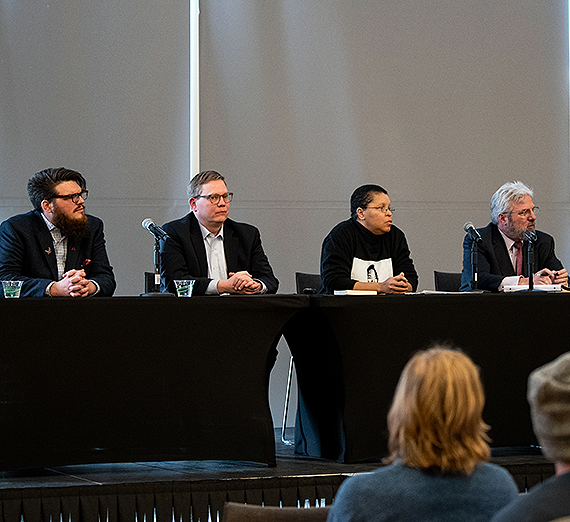Gonzaga Hosts ‘Teach-In on Civil Rights’ on MLK Day

SPOKANE, Wash. — Gonzaga University hosted a “Teach-in on Civil Rights in Spokane” on Martin Luther King Jr. Day, Jan. 21, at the Hemmingson Center Ballroom where speakers discussed issues including housing discrimination in Spokane’s history, and the life and legacy of GU alumnus and civil rights attorney Carl Maxey.
During the Fair Housing Act presentation, Rick Eichstaedt, a law professor and director of Gonzaga’s Environmental Law and Land Use Clinic, and Logan Camporeale, a local public historian, discussed the history of racially restrictive covenants, private agreements between landowners that restrict the use of land in certain ways and are not enforced in Spokane County. These covenants, which discriminated against people of color in the 20th century and prevented them from buying houses in certain neighborhoods, still exist despite passage of the Fair Housing Act.
Laws and remedies passed in Washington state since 1969 make these covenants unenforceable and efforts are underway to remove them from neighborhoods in Spokane County.
During the presentation on Maxey, Dennis Cronin, a Spokane attorney who worked with him for 12 years, said Maxey’s efforts to fight for equality spanned a wide range of issues involving college students, divorce, school districts, voting rights and others.
Not only was Maxey an accomplished lawyer, he was the state co-chairman of Rev. Jesse Jackson’s presidential campaigns and was selected to challenge Sen. Henry Jackson in the 1970 Democratic primary, which he lost. In addition, Maxey was appointed by five different U.S. presidents to serve on the Washington State Civil Rights Commission.
Cronin said that he and Maxey got involved with cases regarding the gang profile unit, created in the 1990s, and racial profiling of young African American men, which resulted in a “never-ending dialogue with the police department regarding gang profiling and the gang unit.”
A 1951 Gonzaga Law School graduate and national championship boxer, Maxey challenged racial policies in education, real estate and social organizations in a career that lasted until his death in 1997. Cronin said Maxey’s efforts continue in the criminal justice system and racial profiling of African Americans in Spokane.
Maxey’s unique contributions were recognized by his peers. In 1982 he received the William O. Douglas Bill of Rights Award, the highest award conferred by the Washington State Chapter of the American Civil Liberties Union. In 1988, the Legal Foundation of Washington presented him with the Charles A. Goldmark Award for his work in promoting equal justice. In 1993, Gonzaga Law School conferred on Maxey its highest award — The Gonzaga Law Medal.
Sandy Williams, publisher of Spokane’s Black Lens newspaper, said racial disparities remain in Spokane regarding aspects of education and in the criminal justice system — noting that African Americans are disproportionally stopped, searched and arrested more than whites.
Williams said groups such as Spokane Community Against Racism (SCAR) and others are continuing Maxey’s work to address systemic racism.
“Here we are, all these years later after Carl is gone, having the same conversations about the same racial disparities that for the most part haven’t changed a whole lot and so what we’re trying to do is look at it from a systems place,” Williams said.
After the event, Williams summarized Maxey’s legacy by saying Spokane is a much better place thanks to his tireless work fighting for racial, social and economic justice.
During a Q&A session after the presentations, the four presenters discussed how restrictive covenants perpetuated discrimination based on race and income in Spokane housing, what motivated them to become advocates for social justice, and how others can become involved in efforts to fight for equality.
The event was sponsored by Gonzaga’s Center for Community Engagement and Gonzaga’s Unity Multicultural Education Center.
